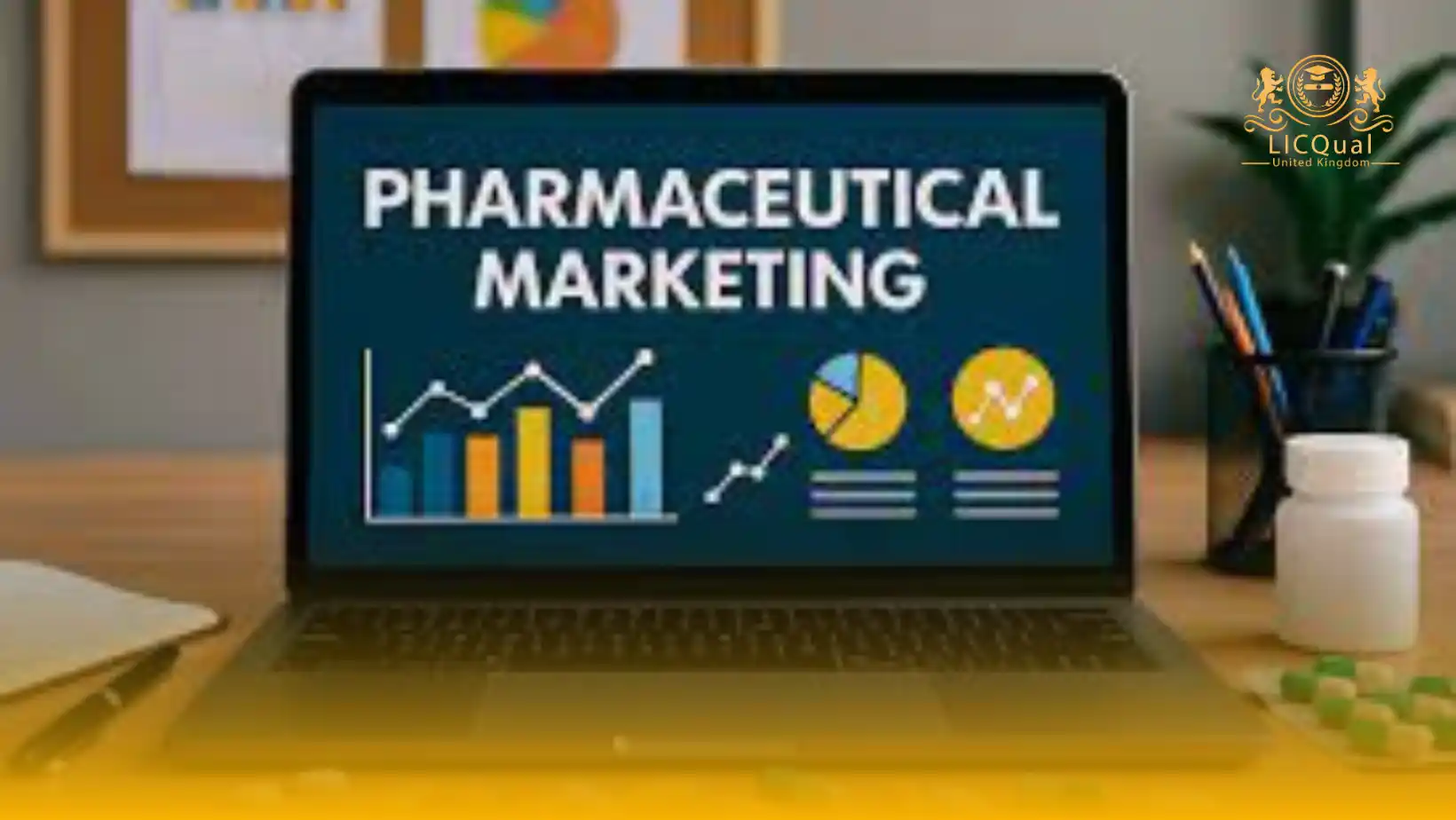The LICQual Level 3 Certificate in Pharmaceutical Marketing (Cert Pharmaceutical Marketing) is a specialised qualification designed to equip learners with the essential knowledge and practical skills required to excel in the pharmaceutical marketing sector. This programme focuses on the unique strategies, regulations, and communication practices that shape pharmaceutical marketing, ensuring learners are prepared to meet the demands of this dynamic industry.
This qualification is aimed at professionals who wish to enhance their career prospects, broaden their expertise, and strengthen their Continuing Professional Development (CPD) in pharmaceutical marketing and business operations. Learners will explore areas such as marketing principles, pharmaceutical product promotion, regulatory compliance, customer relationship management, and market research techniques. By combining theoretical knowledge with practical insights, the course ensures learners are able to contribute effectively to marketing strategies within the pharmaceutical and healthcare industries.
Centres delivering this qualification must ensure they have competent and qualified staff, alongside all necessary materials, facilities, and resources to provide a high-quality training experience. This includes access to up-to-date learning materials, digital resources, and professional guidance that supports learners in achieving success.
By undertaking the LICQual Level 3 Certificate in Pharmaceutical Marketing, learners gain a recognised qualification that not only strengthens their professional competence but also opens pathways for career advancement in marketing, sales, and business development roles within the pharmaceutical sector. This course is an excellent choice for learners committed to growing their expertise and achieving long-term success in the pharmaceutical industry.
Course Overview
Qualification Title
LICQual Level 3 Certificate in Pharmaceutical Marketing (Cert Pharmaceutical Marketing)
Total Units
6
Total Credits
24
GLH
120
Qualification #
LICQ2201141
Qualification Specification
To enroll in the LICQual Level 3 Certificate in Pharmaceutical Marketing (Cert Pharmaceutical Marketing), applicants must meet the following criteria:
|
Qualification# |
Unit Title |
Credits |
GLH |
|---|---|---|---|
|
LICQ2201141-1 |
Principles of Pharmaceutical Marketing and Business Strategy |
4 |
20 |
|
LICQ2201141-2 |
Market Research and Consumer Behaviour in the Pharmaceutical Industry |
4 |
20 |
|
LICQ2201141-3 |
Regulatory Compliance, Ethics, and Legal Frameworks in Pharmaceutical Marketing |
4 |
20 |
|
LICQ2201141-4 |
Branding, Promotion, and Communication Strategies for Pharmaceutical Products |
4 |
20 |
|
LICQ2201141-5 |
Sales Management, Customer Engagement, and Relationship Building |
4 |
20 |
|
LICQ2201141-6 |
Research, Professional Development, and Emerging Trends in Pharmaceutical Marketing |
4 |
20 |
By the end of this course, learners will be able to:
Unit 1: Principles of Pharmaceutical Marketing and Business Strategy
- Understand the core principles of pharmaceutical marketing and its role in healthcare industries
- Apply strategic planning methods to develop marketing initiatives for pharmaceutical products
- Analyse the impact of market forces, competition, and healthcare policies on marketing strategies
- Demonstrate knowledge of product life cycle management within the pharmaceutical sector
Unit 2: Market Research and Consumer Behaviour in the Pharmaceutical Industry
- Understand the role of market research in pharmaceutical marketing decision-making
- Apply methods to collect, interpret, and analyse pharmaceutical market data
- Evaluate consumer behaviour and prescribing patterns within healthcare environments
- Demonstrate the ability to use research findings to guide marketing campaigns
Unit 3: Regulatory Compliance, Ethics, and Legal Frameworks in Pharmaceutical Marketing
- Understand national and international regulations governing pharmaceutical marketing practices
- Apply ethical principles in pharmaceutical promotion and advertising
- Demonstrate knowledge of compliance requirements, including data protection and patient safety standards
- Evaluate the consequences of non-compliance and unethical marketing behaviour
Unit 4: Branding, Promotion, and Communication Strategies for Pharmaceutical Products
- Understand the role of branding in pharmaceutical marketing success
- Apply communication strategies to effectively promote pharmaceutical products
- Evaluate promotional tools, including digital marketing, medical representatives, and educational campaigns
- Demonstrate the ability to design ethically compliant promotional materials
Unit 5: Sales Management, Customer Engagement, and Relationship Building
- Understand the fundamentals of sales management in the pharmaceutical industry
- Demonstrate techniques for building and maintaining customer relationships with healthcare professionals
- Apply customer engagement strategies to improve brand loyalty and trust
- Evaluate the effectiveness of sales campaigns and customer service approaches
Unit 6: Research, Professional Development, and Emerging Trends in Pharmaceutical Marketing
- Understand the role of research and innovation in shaping pharmaceutical marketing strategies
- Critically evaluate emerging trends, including digital marketing and patient-focused approaches
- Demonstrate reflective practice and commitment to lifelong learning and CPD
- Develop a professional development plan to support career progression in pharmaceutical marketing
The LICQual Level 3 Certificate in Pharmaceutical Marketing (Cert Pharmaceutical Marketing) is designed for professionals who want to advance their expertise in pharmaceutical product promotion, healthcare communication, and regulatory compliance. This internationally accredited pharmaceutical marketing certification is ideal for pharmacists, healthcare providers, marketing executives, and graduates seeking CPD credits, career growth, and recognition in global healthcare and business sectors. Whether you are already working in the industry or planning to specialize, this program equips you with the skills and qualifications to stand out in pharmaceutical marketing.
1. Practicing Pharmacists
- Professionals aiming to expand into pharmaceutical marketing roles
- Interested in combining clinical knowledge with marketing expertise
- Seeking accredited pharmaceutical marketing certification for career growth
- Looking to earn CPD credits recognized internationally
- Committed to improving patient engagement through effective communication
2. Healthcare Professionals in Clinical and Administrative Roles
- Doctors, nurses, and allied health staff interested in pharmaceutical promotion
- Those aiming to strengthen collaboration with marketing teams
- Professionals seeking structured training in healthcare communication
- Interested in international healthcare qualifications for career progression
- Focused on enhancing patient safety and awareness through marketing
3. Marketing Executives in the Pharmaceutical Industry
- Professionals working in pharmaceutical product promotion and branding
- Those seeking advanced training in regulatory-compliant marketing strategies
- Interested in evidence-based pharmaceutical marketing practices
- Looking to boost career progression with accredited certification
- Focused on building credibility in healthcare marketing
4. Pharmacy Graduates and Early-Career Professionals
- Recent graduates seeking advanced pharmaceutical marketing certification
- Individuals preparing for international healthcare and business opportunities
- Looking to build expertise in product promotion and market analysis
- Interested in flexible online learning with accreditation
- Focused on boosting employability in competitive healthcare markets
5. International Healthcare and Marketing Professionals
- Professionals seeking globally recognized pharmaceutical marketing qualifications
- Those aiming to meet international accreditation standards
- Interested in CPD credits for career advancement abroad
- Looking to expand knowledge in pharmaceutical promotion practices
- Committed to strengthening professional credibility worldwide
6. Clinical Researchers and Academics
- Researchers focusing on pharmaceutical product development and trials
- Academics seeking structured certification for teaching and training
- Professionals aiming to contribute to evidence-based marketing studies
- Interested in advanced pharmaceutical communication methodologies
- Looking to align with international healthcare education standards
7. Business Leaders and Healthcare Administrators
- Executives overseeing pharmaceutical marketing and sales teams
- Administrators aiming to improve healthcare delivery through effective promotion
- Those seeking insights into pharmaceutical marketing frameworks
- Interested in accreditation and compliance standards for healthcare marketing
- Focused on strengthening organizational credibility and market presence
Centres delivering the LICQual Level 3 Certificate in Pharmaceutical Marketing (Cert Pharmaceutical Marketing) must meet specific standards to ensure high-quality training, learner satisfaction, and compliance with international best practices. The following requirements are essential:
- Qualified and Experienced Staff: Trainers and assessors must hold relevant qualifications and professional experience in pharmaceutical marketing, sales, or healthcare business management.
- Comprehensive Learning Resources: Centres must provide updated course materials, case studies, journals, and access to digital platforms that support pharmaceutical marketing learning.
- Facilities and Equipment: Training providers must ensure classrooms, IT facilities, and online learning environments are well-equipped for both theoretical and practical delivery.
- Assessment and Quality Assurance Systems: Centres must maintain fair, transparent, and consistent assessment processes, with internal verification and quality monitoring procedures in place.
- Learner Support Services: Academic guidance, career support, and mentoring should be available to ensure learners achieve successful outcomes throughout the programme.
- Access to Technology: Learners must have access to computers, internet connectivity, and online tools for blended or distance learning delivery.
- Compliance with Standards: Centres must adhere to LICQual’s quality assurance requirements, ensuring ethical training practices, learner safety, and regulatory compliance.
By meeting these requirements, centres can deliver a world-class learning experience that equips learners with the knowledge and skills to succeed in pharmaceutical marketing and business development.
Assessment and Verification
All units within this qualification are subject to internal assessment by the approved centre and external verification by LICQual. The qualification follows a criterion-referenced assessment approach, ensuring that learners meet all specified learning outcomes.
To achieve a ‘Pass’ in any unit, learners must provide valid, sufficient, and authentic evidence demonstrating their attainment of all learning outcomes and compliance with the prescribed assessment criteria. The Assessor is responsible for evaluating the evidence and determining whether the learner has successfully met the required standards.
Assessors must maintain a clear and comprehensive audit trail, documenting the basis for their assessment decisions to ensure transparency, consistency, and compliance with quality assurance requirements.







